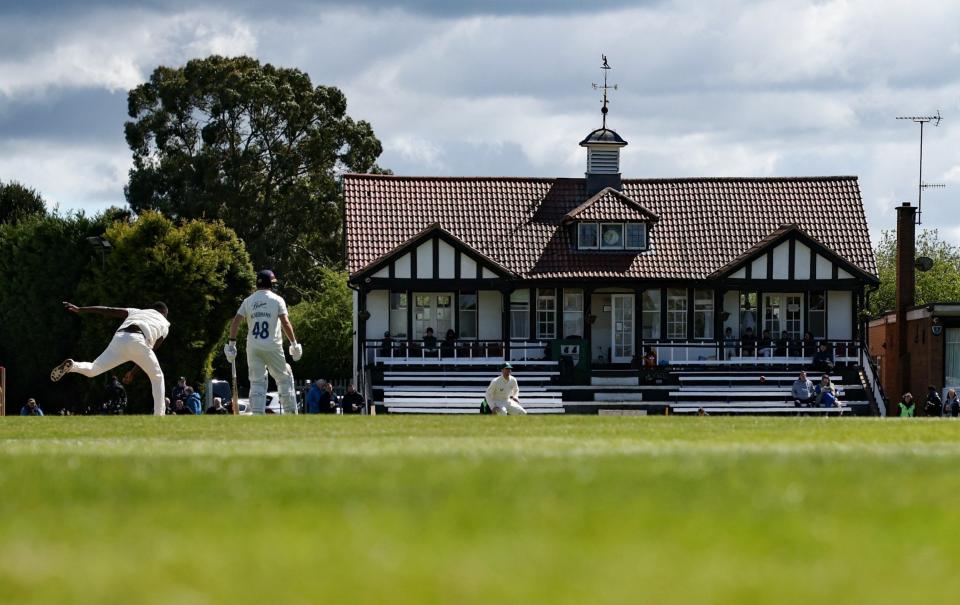I spent a day watching Worcestershire at Kidderminster with New Road out of action

Diary of a day in the west of England where the existence of county cricket is threatened – Gloucestershire by bankruptcy, after announcing the even bigger loss than usual of £1.19m, and Worcestershire by climate change. Flooding has made their headquarters at New Road in Worcester unusable for the first two months of this six-month season, forcing them to play their first two championship matches at friendly, but less iconic, Kidderminster.
08.09am: Depart Bristol Parkway
A train to Cheltenham is required before changing for Worcester. Beware rail replacement buses: this line will be closed next week. Is this an omen? It is fashionable to exaggerate existential threats but county cricket in these parts is fragile. The only county ever to have pulled out of the championship was Worcestershire in 1919 when they could not afford to raise a team, a fate Worcester Warriors rugby suffered last year. The two-carriage train stops at Ashchurch for Tewkesbury station: it sounds as delightful as Adlestrop but is rather more functional.
To bide the time I take out my copy of Wisden, not the latest edition published this week, but the one for 1915 (ok, it is a reprint). Sir Neville Cardus created the impression that the Golden Age of English cricket was the decade or so before the Great War (not that he would have seen more than the odd game). However, Wisden’s review of the 1914 season relevantly stated: “For many seasons cricket in the West Country has suffered both from a want of good players and from public support.”
“Worcestershire, like Gloucestershire, had a sad season, failure in the field going hand in hand with financial trouble. At one time during the summer it was freely stated that the club would have to be wound up, and at a special meeting of the members on August 8th a recommendation to that effect by the committee was brought forward.”
09.47am: Depart Worcester Shrub Hill
A few punters join the train. One says he went to the Worcestershire club office the day before, to ask about tickets for the Kidderminster game, and it was completely closed. Moving lock, stock and barrel is an enormous hassle, not in the old days when Essex, Kent and Glamorgan would use up to eight out-grounds per season, but it is in the era of health and safety regulations: plastic bucket seats (Kidderminster CC has only a few rows of permanent benches in front of the pavilion), loos, refreshment tents, a medical facility, an electronic scoreboard etc. It is going to be four long days for those who get this show on the road, or at the Chester Road ground to be precise.

Today the River Severn is no longer flooding New Road, as it did seven times last winter, but part of the outfield is still mud; the square looks not bad at all after the grass has been able to grow under a marquee. It is still touch-and-go whether Worcestershire will be able to play their first, relatively lucrative, T20 game on 31 May. I have stood uselessly and watched one of the groundsmen, in boots and rubber gloves, having to hose down every inch of the brick walls and car park and the space under the Graeme Hick pavilion - but to do it seven times a winter! And it has to be cleaned every time otherwise no revenue from events and meetings in the club rooms. Where is the bride who wants to smell mud, and polluted mud too, not like the good old days when Fred Hunt was not simply the groundsman but lord of all he surveyed (he earned more than the players owing to the natural challenges) and netted a salmon on the outfield. A plaque on a row of cottages near the Cathedral says they were inhabited by fishermen who made their living out of the salmon in the Severn into the twentieth century. But the chemicals in fertilisers now pollute the longest river in England and Wales.
Before the First World War the composer and librettist Ivor Gurney walked the banks of the Severn further downstream towards Gloucester, drawing inspiration, until he was marched into the trenches and insanity. In his asylum he used to rave about county cricket. To some it means so much.
10.40am: Queue for a ticket at Chester Road
Kidderminster Cricket Club is in the centre of the red-brick town. Each ticket, costing £19 for an adult, takes a couple of minutes. Then the strenuous wind enables the sun to break through and the start is delayed by only half an hour until 11.30. And nothing, in rain or shine, can quell the very English, self-deprecating humour that championship cricket engenders, among supporters or media, whether at a county ground or out-ground.
11.30am: Play begins
Durham have chosen to bat first, even though a Dukes ball is being used for the first time this season. The stalwart Joe Leach and the New Zealander Nathan Smith, a sound signing, pitch the new ball up and find movement, taking two quick wickets. Alex Lees, the former England Test opener, edges low to second slip where the former West Indies captain Jason Holder swoops low to his right. This is good standard: Worcestershire, having so little money, spend it shrewdly when signing.

The beginnings of a crowd muster in bucket seats and their own deckchairs. After two overs lost to a shower, the day becomes fresh and warm. The club’s nets are good. Ivor Gurney would like to be here. And the solution suggests itself, with an English sense of humour: that Worcestershire should move their headquarters to Kidderminster, while Gloucestershire sell up in Bristol and buy New Road. Sorted, at least financially.
2.40pm: Post lunch
After lunch, and a Durham collapse, their Ollie Robinson batted as if he had already been told he will be England’s next Test wicketkeeper/batsman. He is more proactive with the bat than Ben Foakes, a better keeper than Jonny Bairstow since his leg injury, and older than James Rew.
Robinson batted with a swashbuckle that will please this England management, whipping anything straight to leg, and off-driving strongly off the front foot, not just specialising in square-of-the-wicket shots like a keeper of old. He reached his 50 off 41 balls before nicking off going for another drive, but he was left with the tail.

